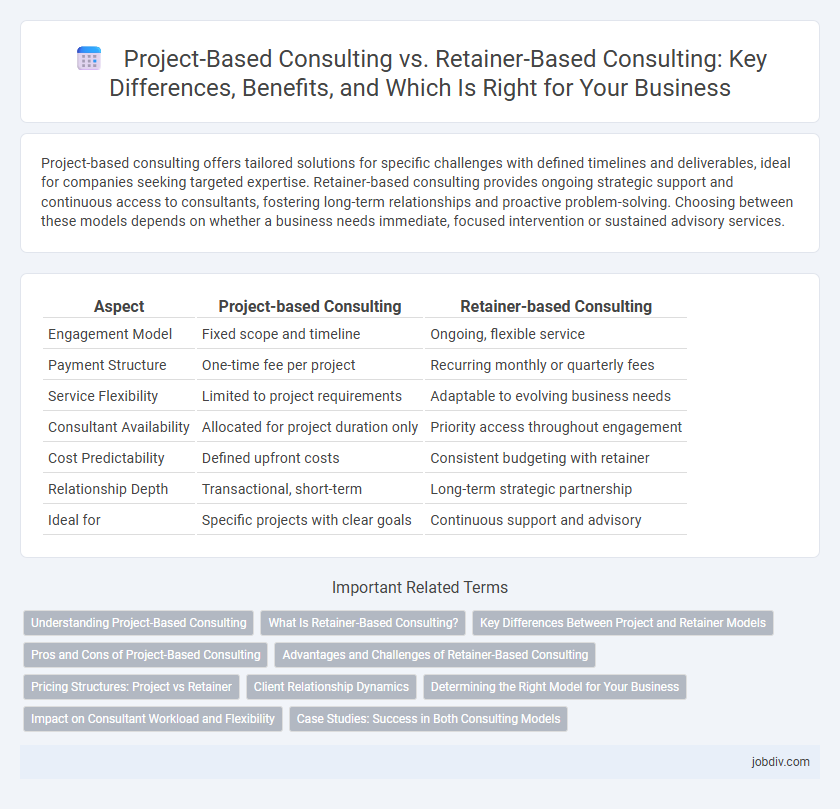Project-based consulting offers tailored solutions for specific challenges with defined timelines and deliverables, ideal for companies seeking targeted expertise. Retainer-based consulting provides ongoing strategic support and continuous access to consultants, fostering long-term relationships and proactive problem-solving. Choosing between these models depends on whether a business needs immediate, focused intervention or sustained advisory services.
Table of Comparison
| Aspect | Project-based Consulting | Retainer-based Consulting |
|---|---|---|
| Engagement Model | Fixed scope and timeline | Ongoing, flexible service |
| Payment Structure | One-time fee per project | Recurring monthly or quarterly fees |
| Service Flexibility | Limited to project requirements | Adaptable to evolving business needs |
| Consultant Availability | Allocated for project duration only | Priority access throughout engagement |
| Cost Predictability | Defined upfront costs | Consistent budgeting with retainer |
| Relationship Depth | Transactional, short-term | Long-term strategic partnership |
| Ideal for | Specific projects with clear goals | Continuous support and advisory |
Understanding Project-Based Consulting
Project-based consulting involves delivering specific, time-bound solutions with clearly defined objectives, allowing businesses to address distinct challenges without ongoing commitments. This model ensures focused expertise and resource allocation, often resulting in faster turnaround and measurable outcomes tailored to individual projects. Companies benefit from predictable budgeting and flexibility, engaging consultants only when specialized skills are required for targeted initiatives.
What Is Retainer-Based Consulting?
Retainer-based consulting involves an ongoing contractual agreement where clients pay a fixed monthly fee for continuous access to consulting expertise and services. This model ensures prioritized support, strategic advice, and flexible resource allocation tailored to the client's evolving business needs. Retainer-based consulting contrasts with project-based consulting by fostering long-term partnerships that enable proactive problem-solving and sustained value delivery.
Key Differences Between Project and Retainer Models
Project-based consulting involves delivering specific, time-bound services with clearly defined scopes, budgets, and outcomes, making it ideal for clients seeking targeted expertise for individual initiatives. Retainer-based consulting offers ongoing advisory support with flexible access to consultants over an extended period, fostering deeper client relationships and continuous strategic guidance. The primary differences lie in payment structure, commitment duration, and scope flexibility, with project models emphasizing fixed deliverables and retainer models prioritizing long-term collaboration.
Pros and Cons of Project-Based Consulting
Project-based consulting offers clear deliverables and defined timelines, allowing clients to budget precisely and assess outcomes efficiently. However, it can lead to limited flexibility and less ongoing strategic support compared to retainer-based models. The structured nature of project-based engagements may also restrict consultants from addressing evolving business needs beyond the project's scope.
Advantages and Challenges of Retainer-Based Consulting
Retainer-based consulting offers continuous access to expert advice, ensuring proactive problem-solving and strategic alignment for businesses. This model fosters long-term partnerships, enabling consultants to deeply understand client needs and deliver tailored solutions, but it demands consistent value delivery to justify ongoing fees. Challenges include maintaining clear scope boundaries and managing client expectations to prevent scope creep and ensure mutually beneficial engagement.
Pricing Structures: Project vs Retainer
Project-based consulting pricing structures typically involve a fixed fee or milestone payments tied to specific deliverables, providing clear budget boundaries and outcomes for clients. Retainer-based consulting uses a recurring fee model, granting clients ongoing access to expertise and flexibility in service scope, ideal for continuous support and evolving needs. Understanding these pricing differences allows businesses to choose the best option based on project complexity, duration, and desired consultant engagement.
Client Relationship Dynamics
Project-based consulting offers targeted solutions with clear deliverables and defined timelines, fostering short-term client engagement and specific outcome focus. Retainer-based consulting emphasizes ongoing collaboration, enabling deeper client relationships through continuous support and strategic alignment. The choice significantly affects client relationship dynamics, influencing communication frequency, trust development, and adaptability to evolving business needs.
Determining the Right Model for Your Business
Project-based consulting offers a fixed scope and deliverables, ideal for businesses with specific, time-bound objectives requiring expertise for a singular initiative. Retainer-based consulting provides ongoing support and strategic guidance, suitable for companies needing continuous advisory services and adaptable solutions amid evolving challenges. Evaluating your business goals, budget predictability, and desired consultant engagement frequency is essential to selecting the most effective model.
Impact on Consultant Workload and Flexibility
Project-based consulting offers consultants the ability to concentrate on defined deliverables within a set timeframe, resulting in fluctuating workloads that peak during project phases and taper off upon completion. Retainer-based consulting provides consistent work volume and steady income, encouraging ongoing client relationships while requiring consultants to maintain availability for diverse, evolving needs. The choice between these models directly affects workload predictability and flexibility, influencing time management and resource allocation strategies.
Case Studies: Success in Both Consulting Models
Case studies demonstrate that project-based consulting excels in delivering targeted solutions for specific challenges, resulting in quick measurable outcomes and high client satisfaction. Retainer-based consulting fosters long-term partnerships, enabling continuous strategic support and adaptive problem-solving that drive sustained business growth. Companies leveraging both models tailor approaches to maximize value, balancing immediate impact with ongoing innovation.
Project-based Consulting vs Retainer-based Consulting Infographic

 jobdiv.com
jobdiv.com